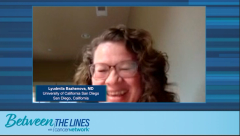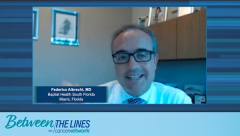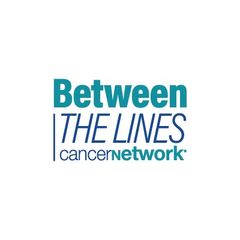
Increasing Rates of Real-World Studies in EGFR-Mutated NSCLC
Drs Lyudmila Bazhenova and Federico Albrecht comment on the significance of real-world data collection in EGFR-mutated non–small cell lung cancer and suggest what can be done to increase the rates of real-world studies conducted.
Episodes in this series

Lyudmila Bazhenova, MD: We do have a couple of good questions that I want to make sure we cover. I do want to be mindful of the time that we have allotted to the discussion. I’ll summarize the discussion. The potential implication of this paper is to raise our awareness of real-world evidence and describe different types of real-world evidence, and the pros and cons. I’ll answer the second question, will you do anything differently in your practice now? At this point I don’t think so in my practice, because I am a believer in real-world evidence, and I do use it, mostly when I need to decide what to do with the population that was not included in the clinical trial that we discussed today.
There are 2 questions I like. I’ll answer the question and I’ll ask Dr Albrecht to answer as well. The first question is, in your opinion, what are the best sources for real-world evidence? I mostly see registry studies, but I feel like electronic health records would be better. Dr Albrecht, what do you think?
Federico Albrecht, MD:Again, I was commenting that our electronic medical records [EMR] are at the beginning, many times we don’t know exactly where to put the information. As long as we do a real good collection of information from those electronic medical records, that is probably the best source we’re going to have, because we can see what happened with real patients with many characteristics, and we can group these patients prospectively and reach conclusions and interpretations from these data. Electronic medical records will be the future, will be the way to go.
Lyudmila Bazhenova, MD: I agree with you. This is an untapped resource, and it is clear that we have several vendors for EMR, and there are certain vendors that are penetrant across different institutions, and care everywhere that we can basically collect the information from different institutions. I don’t think we’ve figured out yet how to get it in a more compliance-appropriate environment like the IRBs [institutional review boards] because it still will require the IRB submission. But as electronic medical records continue to evolve; currently a lot of data we have in EMRs are more text rather than searchable and extractable fields. In the future I think it would be much easier to extract the data without manual reading of the note from the physician but be more able to extract the different data fields, and we can use that information more frequently.
The best sources of real-world evidence outside of the EMR, it’s similar to what we do in the clinical trials. I will have much less confidence in single institution retrospective analysis than multi-institution retrospective analysis. A registry, as I mentioned, is a wonderful thing to do for very rare conditions where at some single institution you probably will not be able to find enough patients to be statistically powered to answer the question. But a registry takes a little effort to set up. It’s more difficult than just doing a retrospective analysis.
Another question I also like is, what populations, aside from geriatrics, do you see in clinics but are underrepresented in clinical trials, that might benefit from real-world evidence studies? Dr Albrecht, we covered several of them, like brain metastases, leptomeningeal disease, and advanced age. Can you think of other categories that could benefit from real-world evidence?
Federico Albrecht, MD:I touched on the uncommon mutations, which are a clear example of how the real-world evidence data led to the approval of afatinib for this indication. The other group of patients is…poor performance status. Remember that many randomized clinical trials will exclude any patients with a performance status above 1. What happens if you have both, an elderly patient with bad performance status, would that patient have more adverse effects with a TKI [tyrosine kinase inhibitor]? There is a study actually included in this paper...that showed that. What was the safety in those patients with poor performance status, is there any worse rash, diarrhea, mucositis, or paronychia, and what happened with the strategy of managing those adverse effects, and for example, dose reducing?
This is how, by a real-world evidence, it was approved that dose reducing from say 40 to 30 mg of afatinib, the effectiveness of the TKI remains, but the adverse effects were much better controlled. You have not only corroborated that there were no new adverse effects, or no worsening adverse effects for those patients who received a TKI under these randomized clinical trials. But you can see that those patients, when you dose reduce, you can maintain that effectiveness and at the same time have control of the adverse effects. Those are the group of patients for whom you feel confident with the real-world evidence that doing what you do, makes sense. I would say patients with uncommon mutations and poor performance status are those for whom real-world evidence has helped me a lot in making decisions for those specific groups not included in the randomized clinical trials.
Lyudmila Bazhenova, MD: Perfect. Thank you, I agree with you. Another area we have that is emerging where the real-world evidence is going to make a difference is, what to do for our EGFR-mutated patients once they say develop resistance to osimertinib or to another drug. At this point, because we don’t have, besides MET inhibition, we don’t have any prospective data, we are forced to pay attention to case reports. Until we get more prospective data, that’s where the real-world evidence is actually going to help us.
I do want to be mindful of the time, and I would like to thank my cochair, Dr Albrecht, for participating and providing valuable discussions today. And I would like to thank all of you for taking time away from your family and being with us and helping us go through that manuscript. Thank you so much.
Transcript edited for clarity.
Newsletter
Stay up to date on recent advances in the multidisciplinary approach to cancer.



































